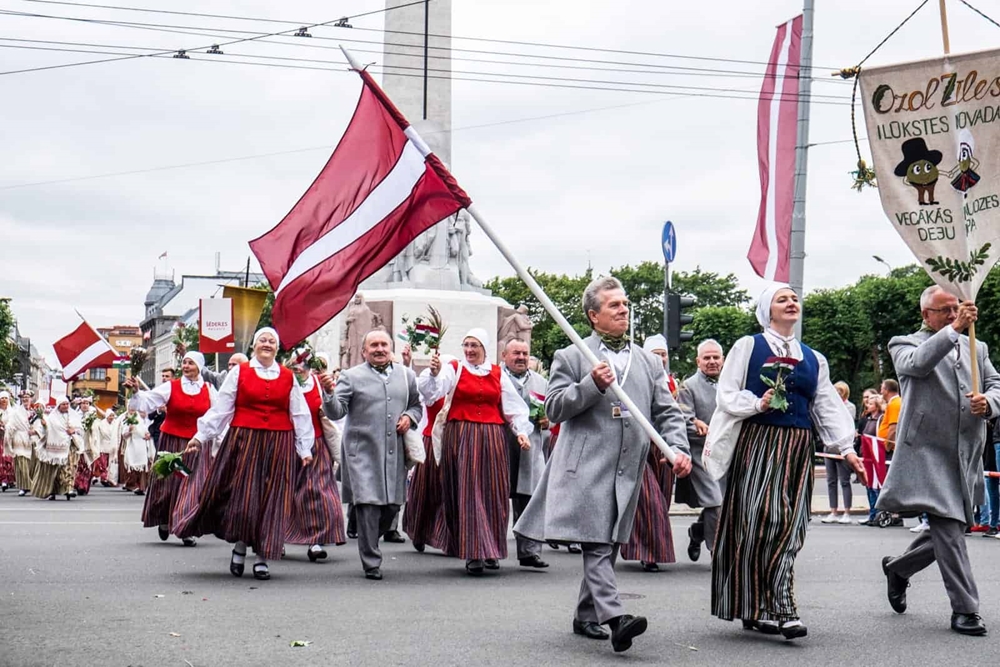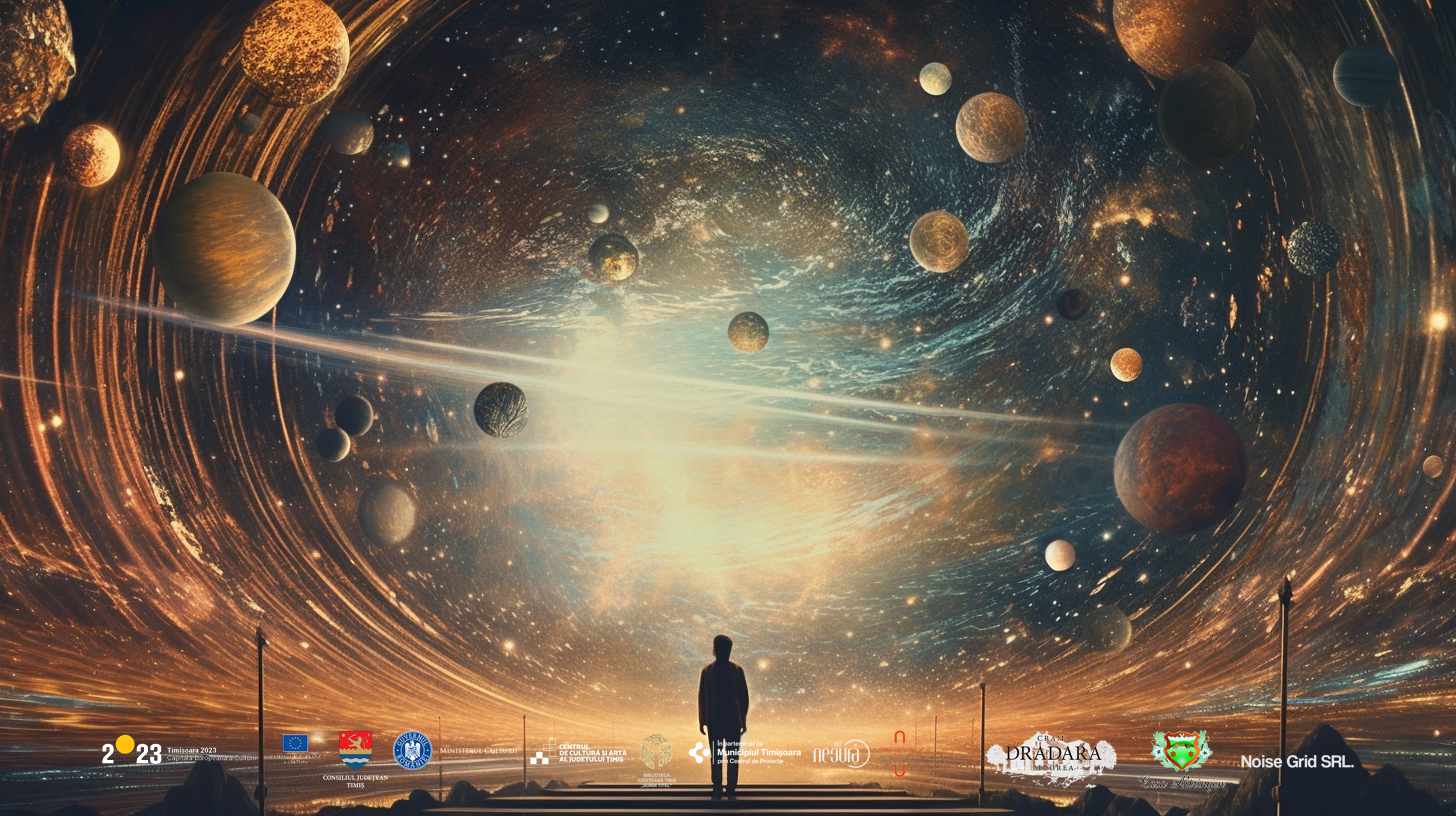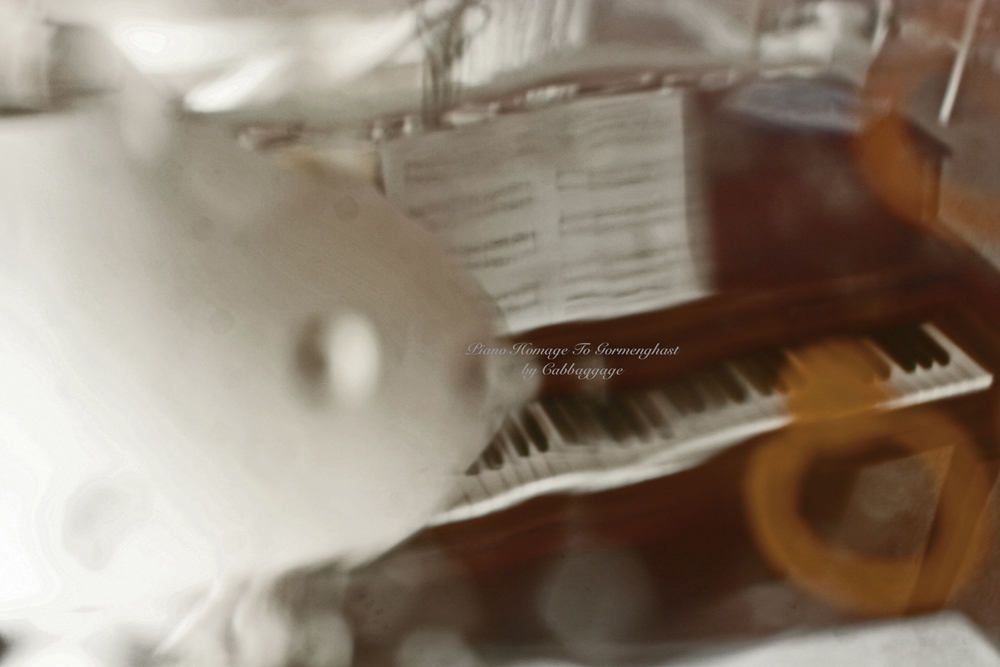Every nation has a cultural identity, and it’s not overconfident to say that Latvia has one of the most beautiful. Latvians love to call themselves a “nation of singers” due to the strong choral music and folk dancing tradition that began way back in the mid-19th century.
Singing in Latvia is everywhere. In fact, choral singing has been part of music education in schools for generations. The country has a considerable treasure of national folk songs everybody knows, appreciates, and likes to sing whenever they can. Today we’re featuring a project called Vienna Balsi by Gilles Deles-Velins and Mara Delesa-Velina, which is based on interviews with Latvian performers and composers.
Hello, Gilles! How is life and music culture in Latvia?
Latvia is such a great country in terms of cultural life, Riga is the host of so many great musicians. We are indeed worried by the current war in Ukraine, and our hope goes to a war that can end quickly and spare lives. As a French citizen, I feel ashamed and live in disgrace when I see the attitude of people like Emmanuel Macron. But fortunately, I have identified the troubles with this man for a long time, and he is no longer « my president » for other reasons long before the war.
What inspired you to establish the Viena Balsi, and what is its underlying concept?
This project aims to enable European and Worldwide audiences to discover Latvian Composers and how music in Latvia is also a form of life deeply rooted in the culture and practices. There’s no better way than giving a voice to the ones who make music alive: composers, performers, and conductors. The One voice of each individual and the One Voice of a Culture are united and diverse simultaneously. I was inspired simply by the Latvians themselves because being a musician here is something normal, it’s a daily life trend, a form of life. I just had to look at things; their culture is a great source of inspiration.
Please briefly describe some of the outreach and educational programs you are looking to aim for through Viena Balsi. Or better yet, what do you hope to accomplish and why?
I think the best way to understand my goal is to look at the teaser.
Please tell us how you conduct the interviews and how soon they will be online.
By the time this interview is online, there will be three interviews online. This is a lot of work because, as my brother-in-law says, I am a «one-man army.» I do all the stuff in the video, from lights to edition and color grading adjustments. I push the buttons of the five cameras of the setup, and I hope nothing gets wrong. Then, I also do the anchor of the show. Fortunately, my wife helps me with much practical stuff in receiving the guests and is an incredible translator. I want to thank all the people who help me and understand the huge amount of work that is at stake. Lionel Marval, Michael Mottet, Tatjana Irwin, Valdis, and Kristaps Abols. They are a fantastic team.
I know you probably cannot get into many specifics but are there any artists you interviewed for Viena Balsi that you can tease?
No problem! The central composer of this first season is Pēteris Vasks not only for his music but because he belongs to a certain moment of history. He is, in a sense, the equivalent of Arvo Part. He was the teacher of the last generations of composers like Evija Skuke orJekabs Jancevskis, but for people of my age like Andris Dzenītis, he was also the spiritual father. There are some fantastic people like Gundega Šmite, who is also a great teacher. Maija Einfelde is a brilliant composer, and she was ignored for a long time which is one of the questions I asked her. Andrejs Selickis is interesting because his vision of music goes through religion and spirituality. Kaspars Adamsons is a servant of music as a dirigent, he will give insights on how and why you conduct a chorine a certain way. Reinis Zarins is a brilliant piano performer for Latvian composers, and I was blown away by his interpretation of Bach’s Goldberg variations.
Do you see Viena Balsi as a long-term project, maybe exceeding the Latvian barriers and reaching Armenia or Georgia in the foreseeable future?
Totally. I have many ideas to extend the project. You speak about Armenia, and I would like to Interview Tigran Mansurian. Contrary to what we think, the Baltics are not homogenous or united. Culture is very diverse, and the information between artists does not necessarily filter the borders. Indeed some bridges exist, but they are a minority. Each country has its own identity and its own will of existential culture and patriotism. The scale of Armenia and Georgia is about the same, except it is in the south of Europe in Caucase. The connexion you make is totally logical, and this idea crossed my mind.
Do people need to be educated about classical music before they can really appreciate it?
If we walk one step aside from this, we could say the same about « experimental » music or jazz. Capitalism always tries to sell us the same cheese, eventually leading to the same disgusting merry-round, conformity and tasteless homogeneity have replaced censorship.
2nd, people have lost the ability to focus on long content because of the grotesque and lobotomizing receipts of cognitive bias, and it became difficult to attend the 4Th symphony of Shostakovich. But again, let’s try to have a bigger view. Classical is a name for all the music made with non-electric instruments in the orchestra, chamber music, or solo instrument like piano and sonatas that are combinations. Suppose people listen to metal (and the metal audience is faithful, enthusiastic, and passionate). In that case, they will come to the conclusion that among their ancestors, there are Bach, Beethoven, and Wagner (among many others).
Other examples: Classical becomes more acceptable when it’s original score music because of the symbolic systems used, the languages and patterns work to suggest things, and suddenly its use becomes more acceptable.
That’s the first path to recognizing classical music and understanding that it is essentially music. About the educational process, in a sense, the answer is « yes » because true culture is disturbing and will always be. But in France, for example, classical music suffers from a dynamic of social classes, what Bourdieu would have called « distinction.» There is a popular vision of classical music for some composers like Brahms, who listened and were inspired by Tzigans or Dvorak. So classical can be popular because of its inspirations.
I also share the idea that to make some complex music understandable, there’s an effort that is to be made by directors and teachers, and a lot of actors in classical music are otherwise gatekeepers or too lazy to make this work. This is what Pierre Boulez thought. My friend Jérôme Gillet does this in their daily work with patience and humility.
Latvians are a nation of great singers and have fascinating choral culture. In fact, once in five years, Latvia becomes the largest choir in the world, including it in a UNESCO list of Intangible Cultural Heritage Festival. No wonder the country has emerged as one of the top tourism destinations in the world. Does regaining its independence after the fall of the Soviet Union play any role in Latvia’s choral culture or impact how people create music?
The song and dance festival never stopped to exist since the end of the 19th century, when he was created. Even USSR had to recognize its reality and greatness. This identity is a matter of survival and independence and is political. Latvian have been so bullied in USSR that they have trouble understanding why a foreigner could be sincerely interested in their culture. Their music and their traditions are not only folk or traditional. This is the greatness and can be listened to as music. I try to oscillate between my will of universalism and the tools I use to identify specific patterns in the form of anthropological relativism because each culture is different. I am not sure this program can be qualified as a sort of ethnomusicology. This is open to debate. I would say I am a « bridge builder.» The time of a common mix of European culture has come.
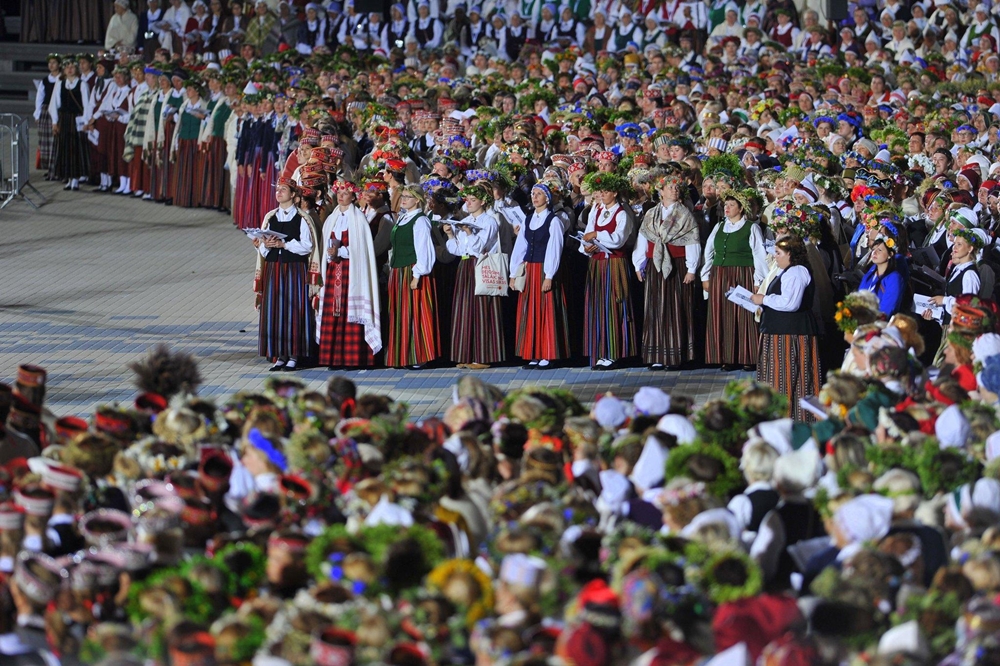
As a musician yourself, what are some challenges you face when approaching an audience and what are some strategies you’ve identified to overcome them?
I am definitely not good at these strategies, so I need a magazine like yours to speak about it. There must be a soft spot for this project between newspaper reviews and google ads campaigns. Good projects need time.
Why do you think so many composers or orchestras cannot gain enough support to stay healthily afloat?
I would say that no classical music project can stay afloat without public funding. Classical music has been at the avant-garde of this dynamic. Now the newspapers are concerned, for example. They complain and need public money to survive (at least in France), but why did they come to this state? Because they wanted guarantees of success and they chose consensus of taste which is the worst option ever. Look at The Wire and how brilliant they are; they survived because they have the guts because choose to make covers with Ligeti. With the digital world eating the entire cultural productions (cinema, ebooks, podcasts, you name it), everything will come to the same state as classical orchestras and classical composers. It’s only a matter of time. When this moment comes, in order to ensure more than survival, there will be options for a rebirth of classical culture. Same in philosophy: when people will have exhausted all the personal development books, all the positive psychology fallacy, they will understand that Marc Aurele, Epictetus, and Plato wrote this 2000 thousand years ago and that we cannot do it much better.
The audiences seem not to get younger. Will there eventually be a box office crisis as audiences age and are not replaced by successive generations?
Totally true. I think philosophy and classical music should be a part of the early education process in schools. We should simply face the question young kids are asking. « Why 1+1=2 ? » this is a very clever question because a kid understands that the addition operation includes a judgment of identity. The 1 on the left of the addition is not necessarily the same as the one on the right. Or why do we say so? But teachers are afraid of these questions because they don’t have the epistemological tools to answer. Same with classical music: why is it so complex? Philosophy and classical music should be a part of the program of kinder gardens, with games and entertainment. We should forbid the use of screens by kids like all the Silicon Valley tech guys do for their kids because, like Pablo Escobar, they know the kind of drugs they are selling, and they protect their kids. These are the only options for a civilized world to come, to say « No » to some things. It’s better than Tik Tok loops, but nobody wants to hear they have grown up in Plato’s cave. Not everything is meant to be condemned in this new world, but we simply need time to build new tools and ethical categories to adapt to these new mediums and make them meaningful and useful.
The main challenge nowadays with all the virtual content is to provide remarkable live performances to the listeners so they want, desire, and commit to return to the concert hall. How do you program music that genuinely addresses the community’s needs and questions?
Again your question is profound and relevant. Based on my experience, Opera is not meant to be recorded, even if there’s an interest in that. Opera is a 3D experience, a total art that mixes script, theatre, music, dance, and something more, which is an ingredient that gives its own substance and a holistic meaning. About orchestras and chamber music, the visual interaction with musicians in an orchestra is interesting. But what matters a lot, I think, is to build concert halls of different sizes with great acoustics to provide a very precise live sound. This is where the quality of life stands. As an indie musician, I always found it unacceptable and excruciating to play music in a disgusting bar where drunk people chat without listening to the music. It’s unacceptable … We can do better than that.
Music is well known to be a therapeutic tool for individuals suffering from depression, anxiety, and other conditions. But if used to more extensive content, can music be an agent for change in society?
Hum, I don’t think so, and the individual scale of whether I am a psychoanalyst is not relevant. No, Art does not change everything, but it is as necessary as the air we breathe. As Tarkovsky used to think, it is a tribute we make to the world’s imperfection. This is the pain and imperfection you can hear in Vasks’ Ziles Zina music dedicated to Goulag deportations. Right now, Ukrainians don’t need fucking hashtags or petitions, or Instagram stories. They need a tank and money. Sorry to be brutal, but this is a basic truth right now. Music and culture made the life of Thomas Bernhard more painful because they increased his awareness of the world. I share this burden, and if you look at my video « an untitled end eventually,» you will understand what I mean.
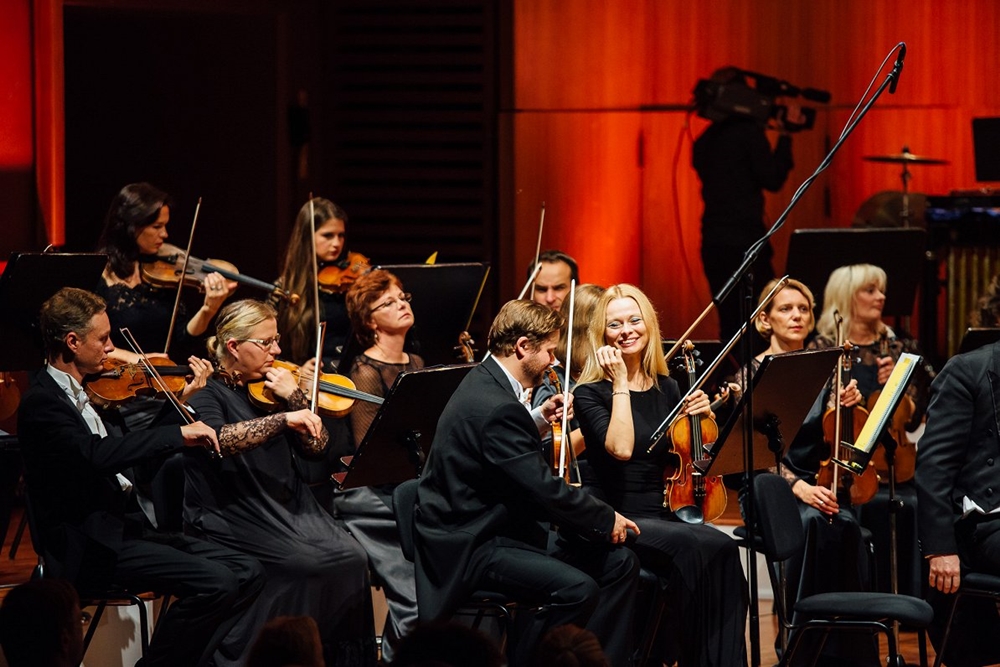
Check Viena Balsi on Youtube
Cover photo via Borders of Adventure
Nicoleta Raicu
Latest posts by Nicoleta Raicu (see all)
- Catching Up w/ IZZY AND THE BLACK TREES, Poland’s Punk Jewel - April 22, 2024
- SOLNEDGANG On Latest EP, Norse Mythology & More - April 20, 2024
- Interiors by David Lynch. A Thinking Room - April 18, 2024
